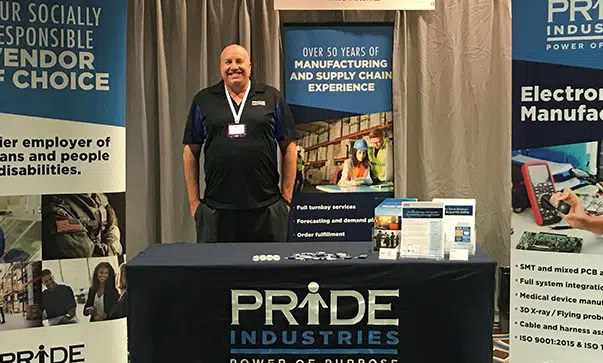The global pandemic has drastically altered many industries, especially in the medical field. What do experts predict will be the newest trend for medical device manufacturers?
Recently, we sat down with Mike Douglas, Manufacturing & Engineering General Manager for PRIDE Industries. Mike has a reputation as a keen observer of the medical technology industry, borne out of a long and successful career. He shares both the opportunities and the roadblocks that medical device manufacturers are facing in today’s rapidly evolving situation.
Q: What is PRIDE’s involvement in the medical device manufacturing industry?
A: PRIDE Industries provides turnkey, end-to-end product solutions, ranging from kitting and assembly to full-blown product manufacturing services. Our current projects are quite varied, and include:
- Manufacturing, assembling, and distributing a best-in-class, non chemical pain relief device used by everyone from professional athletes to casual joggers. Manufacturing this particular device requires us to source more than five hundred unique components.
- Assembling serum and saliva test kits used for antibody testing.
- Assembling and distributing recyclable, biodegradable medical carts used in single-patient and mass-capacity environments of care.
- Manufacturing and kitting of a device used by anesthesiologists in hospital settings to control the dosing of medications.
- Assembling low-cost, respiratory support devices for infants and children, specifically for use in low-resource countries.
Q: How is working with medical device technology more stringent than other industries?
A: The certification requirements for medical devices are far more exacting than for other products. For most products, ISO 90001 certification is the standard, which of course PRIDE has. But because we also manufacture and assemble medical devices, we also have the stricter ISO 13485 certification. This certification mandates greater managerial involvement. Goals must be minutely outlined, with strict accountability built into the various processes. Because of the potentially serious consequences of even a minor defect, we have to be able to track lots and even individual devices. Every shipment that includes a part we manufacture must have a Certificate of Compliance (COC). Our inbound inspection procedures are detailed and thorough, and we conduct quality checks on all the component parts we use.
Q: What sort of changes are you seeing in the medical device industry due to the effects of COVID-19?
A: One of the biggest changes I have seen has to do with the supply chain. Particularly with critical medical equipment, overseas suppliers have become less reliable. Many companies are now worried about the continuity of their production, which is why they’re looking to onshore manufacturing and assembly of equipment that supports critical medical needs.
Another change I’ve seen with the advent of COVID-19 is the shift in demand. Because many elective procedures were suddenly postponed or even cancelled, demand for related equipment dropped. At the same time, the demand for emergency and critical care equipment increased. Fortunately, PRIDE was able to quickly pivot to producing critical care equipment. During the first three months of the pandemic, PRIDE distributed 1.3 million face masks and 55,000 pairs of gloves. We also manufactured 1300 face shields, and distributed 500+ bottles of disinfectant.
Q: How will the pandemic change the face of medical device manufacturing?
A: Because so many companies have suffered from supply interruptions, I expect to see more of them choosing to create a buffer stock of essential supplies. Now more than ever, companies want dual-source capability. No one wants to rely on a single supplier. At a minimum, they want a backup supplier in place. Redundancy is key.
I also think we’re going to see an on-shoring trend. Even before the pandemic, rising tariffs were pushing manufacturing back to the US. Here at PRIDE, I’d already noticed an uptick in queries about landed costs. The fact is, when you look at the total cost of getting a product to the point of sale, PRIDE is a cost-competitive business partner. And I think now that people are aware of how something like a pandemic can rock the supply chain, there’s even more of an impetus to keep medical device manufacturing and supplies close to home.
Q: Has PRIDE seen a surge in the demand for medical devices?
A: Absolutely. There’s certainly been a surge in critical care devices and personal protective equipment. For a while, we saw a spike in ventilator production, but that’s since dropped back to more normal levels. And non-critical care equipment—the sort of devices that are associated with elective procedures—have also seen a drop in demand. But we expect demand for those types of medical devices to come back. People still want to have knee surgery, for example. And “non-urgent” is not the same as “not necessary.” So we expect to see a rebound on routine-care medical equipment, even as the demand for critical-care technology remains strong.
Q: As the global market for medical device manufacturing increases, do you see supply chain and material issues becoming more widespread and longer lasting?
A: In the near term, definitely there are going to be bottlenecks. Getting supplies from overseas will continue to be a challenge. But these supply issues should ease as domestic medical device manufacturing ramps up. And there are other benefits to bringing manufacturing home. Several industries have been plagued with counterfeiting problems and a lack of quality control. With domestic production, a company can exercise much greater control, which ultimately saves money. And it certainly saves a company’s reputation.
Another fundamental issue is the availability of core components. A lot of manufacturers are vying for the same materials. Obviously, if you can’t get supplies, you can’t build your product. And delays in supply acquisition lengthen the lead times in production. So again, onshoring gives a company greater control of the production process.
Q: Medical device manufacturing can be highly specialized. Do you find it difficult to balance medical manufacturing work while still serving other industries?
A: It’s never been a problem for us. In fact, manufacturing medical devices makes us better equipped for other products. Because we’re used to operating at such a high level for medical device manufacturing, we’re able to bring a lot of precision and quality control to our work in other industries. We’re used to the stringent requirements of ISO 13485, and it’s not like we “step down” when we switch to a nonmedical product. On the contrary, it’s our attention to detail—honed through working on medical devices—that has given us such a high customer satisfaction rating across all the industries we serve. Our employees are used to working precisely and efficiently, and our customers recognize that.

